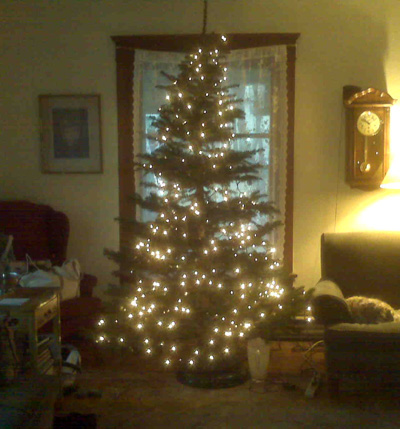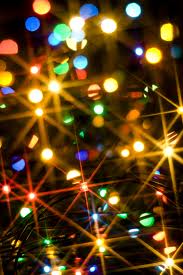 There is nothing special in the world. Nothing magic. Just physics." - Chuck Palahniuk, Diary
There is nothing special in the world. Nothing magic. Just physics." - Chuck Palahniuk, Diary
"Magic is just science we don't understand yet." - Sharon McCarragher
As I sent him out the door into the arctic darkness of a Michigan morning, I told my son that I was out of things to write about. "Give me something." I implored, "anything that pops into your head."
"Christmas lights" was his offering, as he left, bed-headed and sleep-eyed.
This was not the working of a fertile imagination; in order to leave the house he had to pass the lit Christmas tree, the lit garland in the foyer, and the unlit icicle lights on the front porch. It did, however, ignite the proverbial spark in me to write not only about Christmas lights, but about all of the magic that I still believe in, despite 47 years of exposure to the cynicism, disillusionment, pain and loss that exist in the world. I have seen the little man behind the curtain many, many times, but I still believe in the Great and Powerful Oz. Sue me.
As a child, I believed in all kinds of magic - Santa Claus, the Easter Bunny, the Tooth Fairy and the fountain in the mall into which one threw pennies and made wishes. My birthday was a kind of magical celebration of my wonderfulness, and the discovery of a woolly caterpillar on a tree trunk, a toad in the basement window well or a lady bug on a leaf was a unique and amazing event. I also believed that the animals could speak on Christmas Eve, and used to fall asleep on the floor next to our big Airedale, Katie, waiting for her to say something to me. Later, it gave me incalculable pleasure to recreate Santa et al for my own children, leaving elaborate trails of jelly beans through the house (before we had the dogs), making glitter-pen trails on letters from the Tooth Fairy, and simulating reindeer tracks in the snow.
 I have heard people say that they "never really believed in any of that stuff," or (worse) that it's wrong to "lie" to children, and that they are just going to tell their kids straight up that it's all pretend. Unless it's necessitated by religious or economic pressures, it seems like an incredible, selfish shame to deny children the chance to believe in magic because of parental pessimism and disappointment. There is relatively little risk that the average child will be made gullible or stupid as the result of waiting anxiously for the Tooth Fairy; I believed deeply and intensely throughout my childhood, and the little spots of magic that occurred on a regular basis gave me a sense of wonder and possibility that still inspire and delight me. I am not juvenile, or even particularly given to light-heartedness by nature; I am a mature, somewhat melancholy type who genuinely loves the joy of something unexpected, somewhat impossible, and quite wonderful.
I have heard people say that they "never really believed in any of that stuff," or (worse) that it's wrong to "lie" to children, and that they are just going to tell their kids straight up that it's all pretend. Unless it's necessitated by religious or economic pressures, it seems like an incredible, selfish shame to deny children the chance to believe in magic because of parental pessimism and disappointment. There is relatively little risk that the average child will be made gullible or stupid as the result of waiting anxiously for the Tooth Fairy; I believed deeply and intensely throughout my childhood, and the little spots of magic that occurred on a regular basis gave me a sense of wonder and possibility that still inspire and delight me. I am not juvenile, or even particularly given to light-heartedness by nature; I am a mature, somewhat melancholy type who genuinely loves the joy of something unexpected, somewhat impossible, and quite wonderful.
Even when I was too old to believe in Santa, I had a world of magic available to me. My best friend Isabel and I had a lively interest in ghosts, and one summer I left her a series of notes from a sad female ghost residing in a weeping willow-filled lot across the street from my house. She probably never really believed, and I knew I was making it all up, but by mutual agreement, we played our parts until it seemed to us that therewas a ghost, and that if we could be allowed to stay outside late enough, we might see her gliding through the willows in her white dress. We believed that if we built tiny houses outside with mushroom stools and grassy beds, fairies might come and live there when we weren't watching. We believed that there was magic in the world, and much that we read, thought and played confirmed that belief. We are both, I think, better for it as adults.
There are signs of magic even in an adult life, including babies, the first snow of the season, running into an old friend just after you were thinking about her, finding something long-lost and treasured, hearing loons laughing on a still summer night, a solitary piper playing "Amazing Grace," finding the perfect piece of beach glass, falling in love, and books that seem to have been written solely for you by an author you have never met. There are also kinds of beauty - a perfect spider web, a single red berry on a stark lace of branches, a casual arrangement of colored kayaks on the sand - that seem to signal us to stop what we're doing and recognize what goodness this life offers. We can chock these things up to biology, random coincidence, the law of averages, or any number of real and pragmatic things, but do we really have to? No matter how we see the universe, as the creation of a higher power or as evidence of the laws of nature, there are occurrences, and phenomena that have the power to take us, even for a moment, from our daily rounds and give us a glimpse of the magical.
 Which brings me back to the Christmas lights. I know that my husband, and not a merry band of elves, put them there. I understand that they involve current and plugs and filaments and all sorts of other electrical details that interest me not one little bit.
Which brings me back to the Christmas lights. I know that my husband, and not a merry band of elves, put them there. I understand that they involve current and plugs and filaments and all sorts of other electrical details that interest me not one little bit.
They are magic, to me; they were magical when I was a child lying on the floor of the living room, looking up at the patterns created on the ceiling by the tree lights and branches, and it is magical to me at 47 that there is a tree with tiny white lights in my house, and that if I turned out all the lights I would again see that mysterious and beautiful play of light and dark on my own ceiling. (It is important to note that, given my difficulty with scientific principles, even the fact that electricity exists and can be harnessed and brought into my house is somewhat magical).
It's not sappy or sentimental, I don't think, to be awed and surprised by something quite beautiful that really makes absolutely no sense and serves no real purpose other than to be quite beautiful.
Even if, like me, you have much daily truck with sarcasm, cynicism and irony, you should always leave room for magic (and dessert). Otherwise, you miss the best stuff.